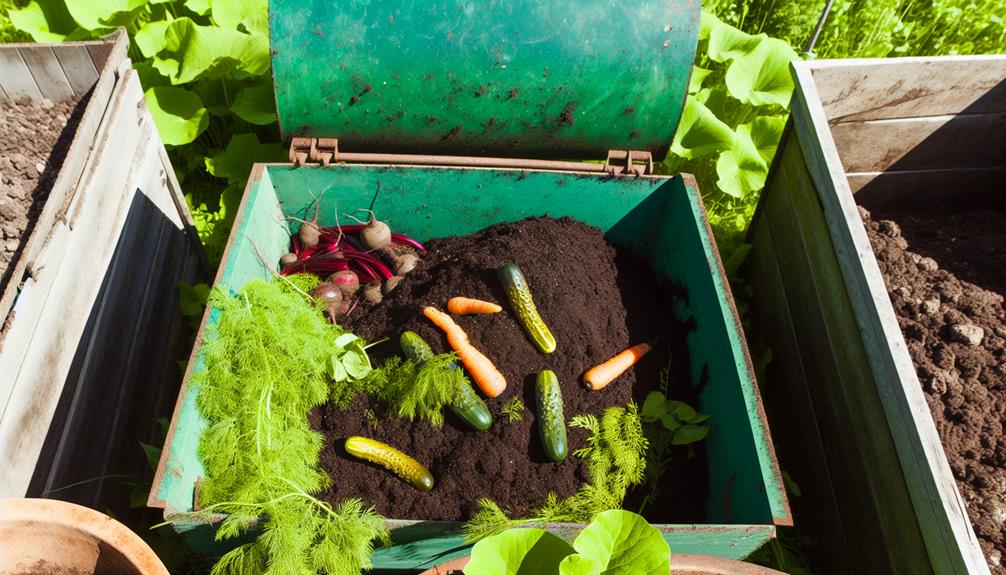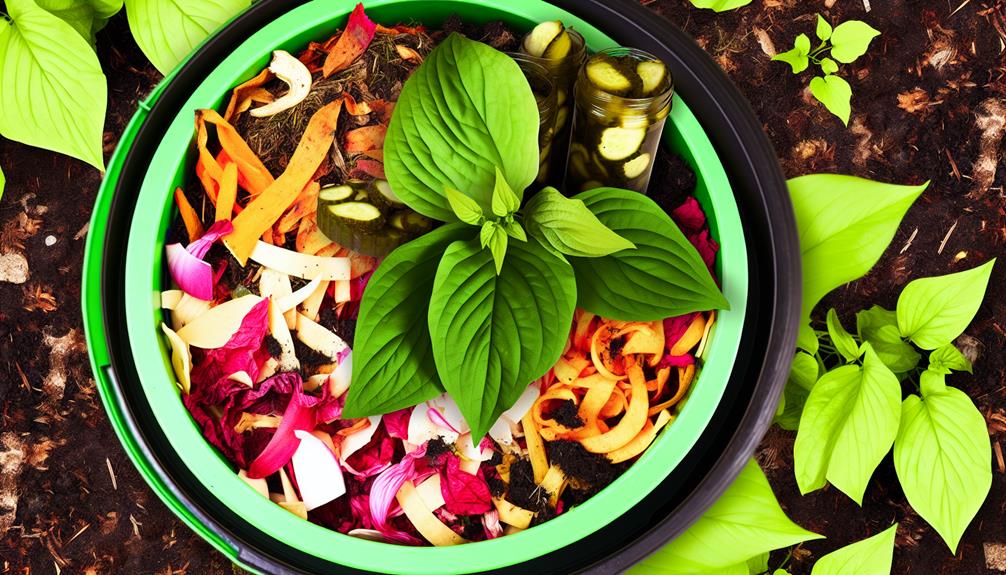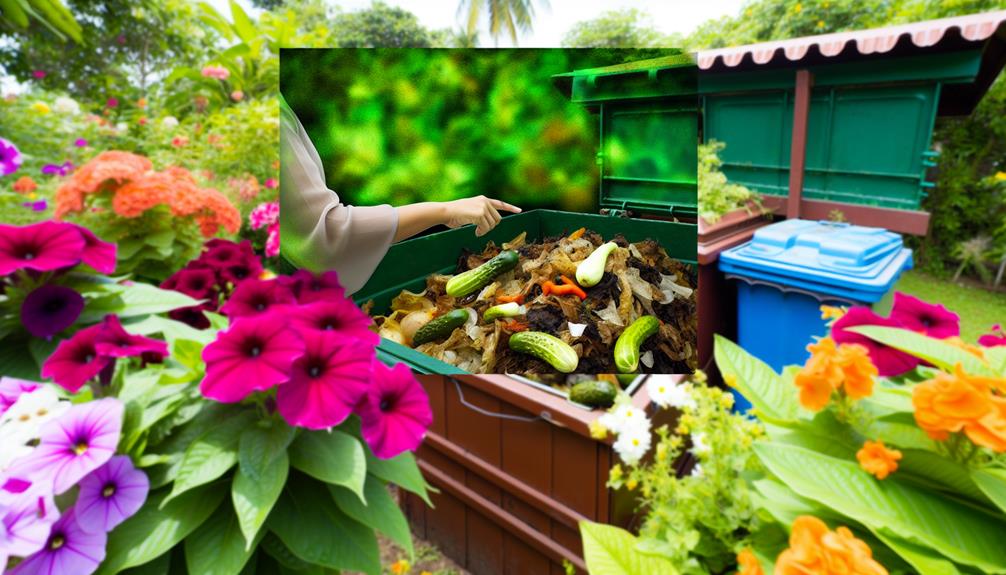

You can compost pickled food, but be cautious. The vinegar and salt content can disrupt the compost’s pH balance and harm beneficial microbes. To compost pickles effectively, drain the excess liquid and dilute the salty brine. Add these items sparingly, and make sure you have a good mix of green and brown materials to balance the acidity.
Regularly turn the pile to maintain aeration and keep moisture levels similar to a damp sponge. By following these tips, you’ll contribute to a healthy compost pile and enrich your garden soil effectively. Discover more ways to optimize your composting process.
Pickled foods are created by preserving vegetables or fruits in a solution of vinegar, salt, and spices. This method not only extends the shelf life of your produce but also enhances its flavors.
The process often involves fermentation, where beneficial bacteria convert sugars into lactic acid, creating that tangy taste you love. Fermentation also plays an important role in maintaining the safety of pickled foods by lowering pH levels, making the environment inhospitable for harmful bacteria.
When you’re making pickles at home, it’s important to monitor the pH levels to make sure they stay below 4.6. This acidic environment is key to preventing spoilage and ensuring your pickles are safe to eat. You can use pH strips or a digital pH meter for this purpose.
Additionally, using the right amount of salt and vinegar is crucial, as these ingredients work together to create the perfect preservation environment.
Understanding these basics of the fermentation process and pH levels will help you produce delicious and safe pickles. With this knowledge, you can confidently enjoy your pickled foods and even share them with friends and family, creating a sense of community around your culinary creations.
Composting is an excellent way to recycle organic waste and enrich your garden soil. By composting, you’re transforming kitchen scraps and yard debris into valuable nutrients for your plants.
To start, you’ll need a compost bin, which helps contain and manage the organic waste effectively.
Here are a few key tips for getting started with composting:
Also Read: Can You Compost Cardboard Tubes?
Understanding how acidity impacts your compost pile is essential for maintaining a healthy and efficient decomposition process. When you consider adding pickled food to your compost, you need to be mindful of the vinegar acidity. Vinegar, a common ingredient in pickled foods, can greatly alter the pH balance of your compost pile.

For compost to decompose effectively, it should have a pH balance close to neutral, around 6.5 to 7.0. Adding too much pickled food can lower the pH, making the environment too acidic for many beneficial microorganisms to thrive. These microorganisms are vital for breaking down organic matter, so maintaining the right pH balance is key.
To manage this, you can add alkaline materials like crushed eggshells or agricultural lime to counteract the vinegar acidity. Regularly monitor the pH levels of your compost with a simple pH test kit.
If you notice the pH dipping too low, take steps to adjust it promptly.
You should be aware that the high salt content in pickled foods can hinder the composting process by damaging beneficial microorganisms. This salt, often found in the brine used for pickling, can cause sodium buildup in your compost pile, creating an inhospitable environment for essential organisms.
To manage the brine effects and keep your compost healthy, consider these tips:
The high salt content in pickled foods can disrupt the delicate balance of microorganisms essential for effective composting. When you add pickled food scraps to your compost pile, the excessive salt can harm the beneficial microbes that break down organic matter. These microorganisms play an essential role in microbial interaction, ensuring that your compost transforms into nutrient-rich humus.
Healthy microbial interaction is important for maintaining soil health, aiding in the decomposition process, and promoting a thriving garden ecosystem. By introducing pickled foods with high salt levels, you risk creating an inhospitable environment for these microorganisms. This disruption can slow down the composting process, leading to an incomplete breakdown of materials and a less effective compost.
To maintain robust microbial interaction and preserve soil health, consider rinsing pickled foods before adding them to your compost pile. This simple step can help reduce the salt content, making it easier for beneficial microbes to function effectively. Additionally, mix these rinsed pickled scraps with other organic materials to dilute any remaining salt.
When composting pickled food, you need to take into account the types of pickled items you’re dealing with.
Common pickled vegetables like cucumbers and carrots are usually easy to compost.
However, uncommon pickled delicacies such as pickled eggs or meats might require special attention due to their different compositions.
Diving into the world of pickled foods, you’ll find that common pickled vegetables include cucumbers, beets, and carrots. Each of these vegetables can be easily transformed through the fermentation process, making them staples in many homemade recipes. The process not only preserves the vegetables but also enhances their flavors, bringing a unique tang to your dishes.
When you decide to pickle vegetables at home, you’re joining a community that values both tradition and innovation. Here’s a quick look at some of the most common pickled vegetables:
You’ll be amazed at how many uncommon foods can be pickled to create delightful and unexpected flavors. Beyond the usual cucumbers and carrots, you can explore fermented fruits and exotic preserves that add a unique twist to your culinary creations.
One intriguing option is pickled watermelon rind. Instead of discarding the peel, you can transform it into a tangy, sweet treat that complements salads and sandwiches.
Another unexpected delight is pickled cherries. These fermented fruits offer a perfect balance of sweet and sour, ideal as a garnish for cocktails or as part of a cheese platter.
Have you ever tried pickled garlic scapes? These curly green shoots aren’t only visually appealing but also pack a punch of garlicky goodness. They’re great in stir-fries or as a zesty addition to salads.
For those with a penchant for the exotic, consider pickling jackfruit. This tropical fruit, when preserved, can be a scrumptious addition to both savory and sweet dishes.
Also Read: Can You Compost Cat Food?
To maximize your small-scale composting efforts, choose a compact bin that fits well in your space and has good ventilation. Container size is important, especially if you’re into urban gardening. A small bin guarantees you can tuck it away easily, even on a balcony or small patio. Good ventilation aids in breaking down materials faster and prevents unpleasant odors.

Here are some tips for effective small-scale composting:
For urban gardeners, a small, well-placed compost bin can make a big difference in soil fertility without taking up too much space. By paying attention to details like container size and ventilation, you can create rich compost that enhances your urban garden.
To maintain your compost pile balanced, focus on maintaining the right ratio of green to brown materials.
You’ll also need to manage moisture levels carefully to avoid creating an overly wet or dry environment.
Regularly aerating the pile will guarantee proper decomposition and prevent unpleasant odors.
Balancing the green and brown materials in your compost pile is crucial for creating rich, fertile compost. Greens provide nitrogen, a key nutrient for microbial activity, while browns supply carbon, which helps maintain compost structure and airflow.
Achieving the right ratio can be tricky, especially when adding pickled foods, which have undergone a fermentation process as a preservation method. You’ll want to make sure the acidity from the pickling doesn’t disrupt the balance.
To help you strike the right balance, consider these tips:
Maintaining the right moisture level in your compost pile is just as crucial as balancing greens and browns. When you add pickled food to your compost, the moisture from the brine can make your pile too wet. To manage this, you should first drain excess liquid from the pickled items. This will help keep your compost from becoming waterlogged, allowing it to decompose efficiently.
If the pickled food is still too salty, you can dilute the brine by rinsing the items with water before adding them to the pile. This reduces the salt levels, preventing them from harming the beneficial microbes in your compost. After addressing the moisture from the pickled food, make sure your overall compost pile has the right balance. A good rule of thumb is to have the material feel like a damp sponge—moist but not dripping.
Regularly check the moisture levels and adjust by adding dry browns, like leaves or straw, if it’s too wet, or greens, like kitchen scraps, if it’s too dry.
Proper aeration is essential for efficient decomposition in your compost pile. Without sufficient oxygen, the organic materials won’t break down as quickly or effectively. You need to regularly turn your compost to introduce fresh air and maintain ideal oxygen levels. This process also helps to create air pockets, which are vital for aerobic bacteria to thrive.
To balance your compost pile, consider the following tips:
If composting pickled food isn’t feasible, there are other effective disposal methods you can consider. One practical option is food donations. Many local food banks or community kitchens accept non-perishable items, and some might take pickled foods, especially if they’re unopened and still within their expiration date. Check with these organizations to see if they can use your pickled items to help those in need.
Another viable method is using pickled foods as animal feed. Some farms or animal sanctuaries might accept certain types of pickled foods for their livestock or rescue animals. Before you deliver anything, make sure the pickled food is safe for the animals by consulting the facility or a vet. They can provide specific guidelines on what’s suitable and what’s not.
Additionally, consider repurposing pickled foods in creative ways. For instance, you can use them in recipes or as ingredients in homemade sauces and dressings. If you have a large quantity, organizing a community swap event could be a fun way to exchange pickled items with neighbors.
Exploring these alternatives not only helps reduce waste but also fosters a sense of community and resourcefulness.
Also Read: Can You Compost Cantaloupe?
When you compost correctly, you transform organic waste into nutrient-rich soil that can boost plant health and reduce landfill waste. Proper composting offers numerous benefits that are essential for both your garden and the environment.
Firstly, composting enhances soil enrichment. The compost you produce is packed with nutrients that improve soil structure, water retention, and fertility. Your plants will thrive in this enriched environment, needing fewer chemical fertilizers.
Secondly, composting is a significant step towards waste reduction. By composting, you divert organic waste from landfills, reducing the production of harmful methane gas. This simple act can contribute to a healthier planet.
Consider these benefits of proper composting:
You’ll need compost bins and compost turners to effectively compost pickled food. Embrace the community spirit by sharing tips with fellow composters, ensuring everyone benefits from sustainable practices and turning waste into valuable soil enrichments.
The decomposition rate of pickled food varies. Due to the fermentation process, it can take longer to break down compared to fresh food. Expect several months, but your compost community will eventually welcome these nutrients.
Yes, pickled food can attract pests to your compost pile. The pickling process creates strong odors that pests love. For effective pest prevention, avoid adding pickled items to your compost, and everyone will benefit from a cleaner compost.
You might wonder if it’s safe to compost pickled food indoors. The fermentation process creates an acidic environment, which can disrupt your indoor compost. Stick to non-pickled items for a healthy, pest-free composting community.
You can use composted pickled food in vegetable gardens, but monitor soil nutrients. The acidity levels from pickled food might affect plant growth. Join your gardening community to share tips and guarantee a balanced, healthy garden.
To sum up, while you can compost pickled foods, it requires careful management. Always be mindful of the acidity and salt content, as they can disrupt the composting process.
Balance your compost pile by mixing pickled items with other organic materials to neutralize their effects. If in doubt, consider alternative disposal methods.
Proper composting benefits your garden by enriching the soil, so it’s worth the effort to do it correctly. Follow these tips for a successful composting experience.

Don't let aphids, slugs, and caterpillars ruin another plant. Take back control with simple, natural methods that actually work.